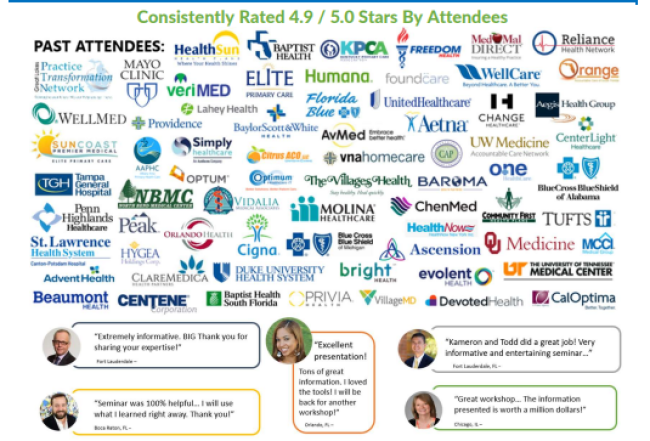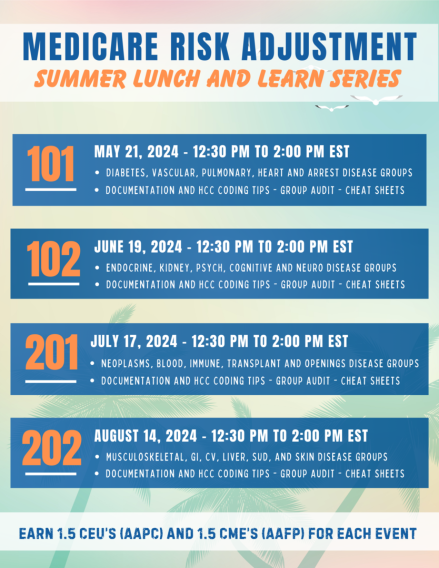Where to Find Us:
Empirical Risk Management
Phone: 772-210-2823
Fax: 772-210-2824
Kameron Gifford, CPC
772-267-9453
Todd Gifford, MBA
772-267-8156
What's New
ERM has a NEW Blog:
Initiating Change From The Initial Point of Care
- Empirical Risk Management is an evidence based process of identifying, managing, documenting and improving quality of care.
- Our proprietary model of risk adjustment will help managed care organizations streamline their operations, reduce costs and improve outcomes.
- Empirical Risk Management is formed around the concepts of teamwork, partnership, service, and quality, both in the coordination of our efforts and in our interactions with our clients and their respective members.
Medicine is Destined to Become the Most Regulated Industry in the World...
Are you looking for the best education available in risk adjustment, value-based payments and/or CDI? Good News - You have found it! Join us for a day of risk adjustment and get the BEST risk adjustment education available for $49.
Do you need CMEs or CEUs? We have that too!
All Workshops are approved by the American Medical Association, American Academy of Family Practice, Commission for Case Manager Certification, and the American Academy of Professional Coders.
Register your team (3 or more) today to save 10% on any 2024 Workshops!
Approved by the AMA, AAFP and AAPC
ARM Workshops 2025 Dates.pdf
Adobe Acrobat document [1.4 MB]
Upcoming WEBINARs:
Join us for an exciting summer Lunch and Learn Series! Register your specialists, primary care providers, coders, auditors, and education team! Includes four webinars (1.5 hours each) covering clinical documentation and HCC coding for a total of 21 CMS-HCC Disease Groups. Each session is approved for 1.5 CEUs from the AAPC and/or 1.5 CMEs from the AAFP. All attendees will receive a copy of the presentation and pdf “cheat” sheets for each disease group.
Disease Groups Included:
Medicare Risk Adjustment 101 – Diabetes, Vascular, Pulmonary, Heart and Arrest
Medicare Risk Adjustment 102 – Endocrine, Kidney, Psych, Cognitive and Neurological
Medicare Risk Adjustment 201 – Neoplasms, Blood, Immune, Transplant and Openings
Medicare Risk Adjustment 202 – Musculoskeletal, Gastrointestinal, Cerebrovascular, Liver, SUD, and Skin
Dates and Registration Links:
Medicare Risk Adjustment 101 – 5/21/2024, 12:30 pm to 2:00 pm EST
https://events.eventzilla.net/e/medicare-risk-adjustment-101-2138605516
Medicare Risk Adjustment 102 – 6/19/2024, 12:30 pm to 2:00 pm EST
https://events.eventzilla.net/e/medicare-risk-adjustment-102-2138605513
Medicare Risk Adjustment 201 – 7/17/2024, 12:30 pm to 2:00 pm EST
https://events.eventzilla.net/e/medicare-risk-adjustment-201-2138605512
Medicare Risk Adjustment 202 – 8/14/2024, 12:30 pm to 2:00 pm EST
https://events.eventzilla.net/e/medicare-risk-adjustment-202-2138605509
Who Should Attend?
- Specialists and Primary Care Providers
- Risk Adjustment Managers and Directors
- Risk Adjustment Coders, Billers, Auditors and CDI Professionals
- Provider Education Teams
- Health Plans, ACOs, IPAs, MSOs and Medical Practices
Empirical Risk Management is an evidence based process of identifying, managing, documenting and improving quality of care.
HOW WE CAN HELP
- Identify gaps in coding and documentation that lead to inaccurate risk profiles
- Utilize multiple sources of information to transition providers into a prospective system
- Provide education and training specific to the needs of each individual practice
- Implement and monitor improvement plans to ensure 95% accuracy of claims
- Design and initiate compliance plans to ensure protection against state and federal penalties
- Analyze, collect and improve HEDIS measurements across every practice
- Increase member awareness and understanding of chronic diseases through outreach programs
- Documentation and revenue risk assessments proceeding transition into ICD-10
- Provide comprehensive ICD-10 transition services that include planning, education, implementation and monitoring
**IMPLEMENTING CHANGE FROM THE INITIAL POINT OF CONTACT**
The Next Wave of Disruptive Innovation
Medicine is destined to be the most regulated industry
in the world. The current culture of healthcare in America challenges
traditional business models on everything from cost to implementation to how we
gather feedback about the patient experience. This paramount shift in the way
we evaluate our physicians and choose our health plans further supports the
need for continual innovation. In this new generation of due diligence, the
entire healthcare community has become accountable not only in the state and
federal courts but in the court of public opinion as well. This new arena
demands strong fiscal oversight, tangible transparency and outcomes that are
determined by the level of patient engagement. The old boardroom dialogue,
centered around the acquisition and internal uses of big data, have given way
to new questions. Senior executives and are now asking, “How do we get our
members excited about using all of this data?”
The fact that this question is now being asked by the most influential decision
makers in healthcare signals the beginning of a new kind of disruption, a
digital disruption.
This digital disruption will be pioneered by leaders using technology to create
innovative platforms to engage patients and change behavior. The champions of
the future will be determined by the individual capacity of a corporation to
modify and adapt. Inventions will no longer depend on handcrafted products but
instead be shaped from ideas, concepts and processes presented across multiple
platforms that can be accessed from anywhere any time any place.
The health plan of the future will engage patients through digital apps that
can monitor compliance, Create custom QR Codes for HEDIS Measures to allow for
real time tracking, all while assessing member satisfaction with the plan,
pharmacy benefits and primary care providers.
In fact, the tools themselves will have nothing to do with the digital
disruption, it will be the meaningful ways in which we use these tools to meet
the needs of patients. Success or failure will be contingent not on what you
create but what you do with it next.
The cost of healthcare is unsustainable. First premiums were raised to try and
get consumer involvement. That was followed by employing variable cost shares
and quality incentives. None of which have influenced behaviors. Perhaps
because all of those affect us indirectly. Innovative platforms such as Apps
have been able to reach their audience in the most intimate of places.
Are you prepared for the digital disruption?
Kameron Gifford, CPC
4-18-2013





